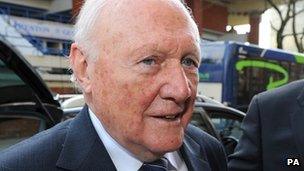Will police stop naming suspects?
- Published
- comments

Stuart Hall: Named - and then more victims emerged
Should we, the public, know who the police have arrested? Do people deserve anonymity until the point that the police charge them with an offence - or in the case of some crimes - anonymity until convicted?
Ever since the Leveson Inquiry and the related criminal investigation into how some journalists acquire information from the police, there has been a row brewing between police chiefs and newsrooms over the flow of information.
The row broke surface this week when Warwickshire Police decided not to name a former police officer who had been charged with theft from the force's former headquarters.
That led to a broad accusation from some journalists that it was symptomatic of increasing secrecy from the police - secrecy which is making it harder for reporters to find out what officers are doing in the public's name.
When someone is arrested for an offence - and the incident appears to be newsworthy - journalists will try to establish what has happened. That ultimately means trying to establish who has been arrested, because journalists want their reporting to be accurate.
But the police's position in relation to names is shifting in the wake of the Leveson Inquiry report.
Lord Justice Leveson said that arrested suspects should not be named "save in exceptional and clearly identified circumstances", external.
Current practice is that a police force issues a statement along the lines of a "A 34-year-old man has been arrested on suspicion of such-and-such a crime".
What happens next varies from force to force. Some will informally confirm the name of the person arrested if journalists have worked it out for themselves. Some won't.
Police chiefs want to introduce an official policy under which forces would "neither confirm nor deny" (NCND) the name of anyone arrested.
The point of the proposed NCND policy is to end what Chief Constable Andy Trotter, who leads on media policy for forces in England and Wales, says is a "bizarre parlour game" in which a reporter tries a variety of creative and persuasive techniques to receive some guidance on whether or not the name is correct.
Writing in the Press Gazette, external, the industry website, Andy Trotter said the current situation "is less than satisfactory, with no-one certain as to what can be expected, and a pervasive sense that these arrangements may not be transparent or fair. This is damaging to public confidence in both police and media".
He says there would be exceptions where it would be in the public interest to name on arrest.
The broad argument put by news organisations is that the public interest test being considered by the Association of Chief Police Officers is not the same issue as deciding what the public is legitimately interested in.
Further, naming a suspect who has been arrested can lead to more victims coming forward.
That is what happened in the case of BBC broadcaster Stuart Hall, who has admitted 14 charges of indecent assault. More of his victims came forward after the media reported he had been arrested on a handful of allegations.
Speaking on BBC Radio 4's World at One programme on Thursday, The Times' crime editor, Sean O'Neill, said Surrey Police could have uncovered more about Jimmy Savile's crimes if it had named him when it had him under investigation.
The counter-argument is that someone who is arrested will be tainted by the impact of being named, even if they are innocent. The headline screaming "John Smith Arrested" won't be matched by one declaring "John Smith Goes Free".
Nowhere is that argument more compelling than in the case of the ordeal-by-media experienced by Christopher Jefferies, wrongly arrested in relation to the murder of Joanne Yeates. The innocent man later told the Leveson Inquiry that once his name was out, he suffered a "frenzied campaign to blacken his character".
That feeling of gross unfairness at the hands of parts of the media appears to be shared by many members of the public. A survey for The Independent newspaper found three-quarters of those interviewed believed that people accused of serious sexual offences should benefit from anonymity.
The chairman of the Bar Council, the professional body for barristers, has also called for anonymity in sexual offences.
One backbench MP has even tried (and failed) to make it a crime for a journalist to name arrested people without official permission, external.
But the Law Commission, which advises ministers, takes a different view - it says that police should release names unless there are compelling reasons not to do so, external.
The Warwickshire Police case was, however, of a completely different order. On Wednesday, it refused to name a former police officer charged with a major act of theft.
"Due to a change in policy we no longer release the name of an individual on charge," said the force. "Journalists may request a surname for guidance the day before the first court appearance by calling the newsdesk."
It later said the policy was in keeping with national police policy.
It wasn't - and the force ultimately admitted it had been wrong and has since named the former officer as Paul Andrew Greaves.